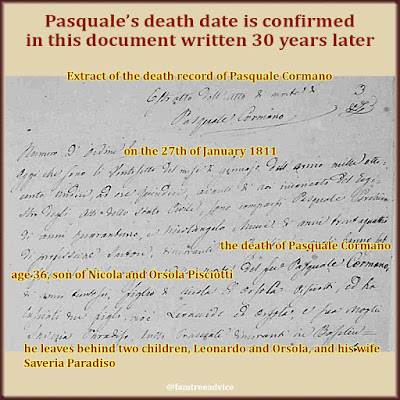If the people involved are long gone, a scandalous story should be OK to share. Don't you think?
I've read thousands of birth, marriage, and death records in my family tree research. They're mostly in Italian and from the 1800s.
 |
| This was flagged as an error, but, unfortunately, it's correct. |
In my tiny ancestral hometowns, a few babies were born out of wedlock each year. Sometimes the birth record names the mother, but not the father. Most of the time it doesn't name either one. Only the midwife knows who gave birth to the baby.
Doesn't that seem like it should have been a huge scandal in the early 1800s? Especially for the woman who admits to having a child out of wedlock. But it happened every year. That's just the way it was.
Yesterday, after making a ton of edits to my Family Tree Maker file, I thought I'd better check it for errors. I exported my GEDCOM file and tested it with Family Tree Analyzer. It's a free program with a ton of powerful tools.
What a lifesaver that program is. It found some mysterious duplicate fact entries I didn't know were there. It found a woman, all by herself, connected to no one. She was a forgotten remnant of a marriage I'd decided to delete from my family tree.
But the most interesting thing Family Tree Analyzer found may be a deep, dark family secret.
 |
| This baby was born just a little too long after his father died. |
Pasquale Cormano was born on 21 November 1811, a full 10 months after his father died. The death record of his father, also named Pasquale, shows he died on 27 January 1811. Another copy of the record, written for his grandson's marriage in 1841, confirms that death date.
That supposed 10-month pregnancy made me look more closely at all the documents. It was baby Pasquale's uncle, Leonardo Cormano, who presented the baby to the mayor when he was born. That's normal when the father of the baby is dead or unable to bring the baby himself.
It was traditional to name a baby after their father if he died before the baby was born. If the dead man's child was a girl, she got a feminized version of her dead father's name. Like Pasquala, Giuseppa, or Giovanna. When Pasquale Cormano's widow, Maria Saveria Paradiso, gave birth that 21st day of November, she named the baby Pasquale after her late husband.
But…are we to believe that Maria Saveria and her husband had relations as late as the day of his death? And that the baby was in utero for a whole extra month?
 |
| Was something scandalous happening when this man was about to die? |
I checked out the baby's "Uncle Leo" Cormano. He was a few years older than his brother Pasquale. And when he died, 13 years after baby Pasquale was born, he had never married. He was a 54-year-old contadino—a man who worked the land.
The mother of this miracle baby, Maria Saveria, was a young mother of two when her husband died. When she finally gave birth to little Pasquale, she was 25 years old with 2 toddlers and an infant.
Isn't it easily possible that the ill-fated Pasquale was not the father of the baby? Isn't it intriguing to think that "Uncle Leo" may have been more involved than it seems?
So, what happened after baby Pasquale was born to a dead father? In 1814, widow Maria Saveria had 3 children, ages 7, 6, and almost 3 years old. That's when she married a widower named Giovanni Palmieri. The year before, Giovanni's 9-year-old daughter died, leaving him with 5 young children.
It's hard to imagine that their marriage, creating a household of 8 children, was a better option. But they each needed a partner to help raise the children and keep a house.
Ten years after Maria Saveria and Giovanni married, "Uncle Leo" died alone. Maria Saveria lost her 2nd husband in 1831 when she was 45. By then, another of Giovanni's children had died, the older children were married, and only her 3 Cormano children were still with her.
You know what that means, don't you? I have to search for Maria Saveria's third marriage!
What will a routine check of your family tree file reveal?
Interesting post. In defense of Maria Saveria, the human gestational period is 280 days or 40 weeks. Full term babies are born from 37-42 weeks. It's close but possible. How did Pasquale die?
ReplyDeleteIt's a stretch. Even if he died while impregnating his wife, it's a stretch. The death records from that time and place didn't include a cause of death.
DeleteDiAnn - You write, "That's when she married a widower named Giovanni Palmieri. The year before, Giovanni's 9-year-old daughter died, leaving him with 5 young children." Did you mean his wife, age X9, or something else. Why would the death of a daughter cause him to marry? When did the mother of his children die?
ReplyDeleteGiovanni's wife died a couple of years earlier. I mentioned his 9-year-old daughter's death just to explain how many children he had. It was the living children that caused him to remarry, not the dead one.
DeleteLOL Daddys grandparents didn't marry until after their 3 child (of 9) were born. Good solid DNA matches to all the kids, too.
ReplyDeleteBut then, Grandpa's parents never married, sooooo